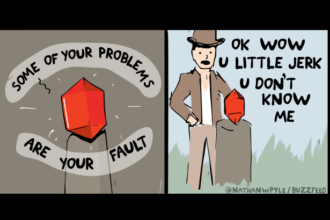Essentials of Character Backstory

Building a character backstory doesn’t have to be a lengthy or labor-intensive affair. And you don’t have to write beautiful fiction to create one that will be useful during play. Instead of character backstory as a story, think of your character backstory as inspiration for use during play.
Finding Fuel
When an actor prepares for their role, they gather together the following:
- All the given circumstances as presented by the script
- All character information
- Personal experiences to draw on
- Any additional research needed (optional)
Similarly, you can do the same for your character. Let’s adapt this to a typical Dungeons & Dragons campaign then.
Given Circumstances
Given circumstances or “givens” is the agreed-upon world-building lore of a particular campaign. For example, if you’re playing a game along the Sword Coast in the Forgotten Realms, there are certain given circumstances based on that setting.
These are things like how half-orcs are treated, the nature of magic, who is in power, how history has shaped the land. Gather together the givens that are directly related to your character. At this step, just pull in as much information as is useful and interesting. Feel free to drop any lore that doesn’t apply to your character.
Put these circumstances into a list format. You can keep this list of givens as short or as long as is useful.
The givens create a kind of container for your character. They define in broad strokes the constraints your character operates in. Stuff like gender roles, class divisions, impact what options we as people have in our lives, and what decisions we make. Similarly, the list of givens can help you get more specific and informed about your character.
Character Information
This is where you get to do some invention and flesh out your character’s:
- Habits
- Likes
- Dislikes
- Fears
- Hopes
- Dreams
- Life goal
You can start small, and try to picture what your character would do day-to-day and from there develop their larger goals. If you decide to give your character a dislike of soup, that could be a great place to expand and develop a character trait. Maybe they dislike soup particularly because they associate it with a time in their life where they were so poor they couldn’t afford anything other than broth.
The only one that you should try to nail down is their life goal, which I’ve also called their central quest or super-objective. What does your character want to achieve in their lifetime? What are they aiming toward? How do they want to be remembered?
You can let the others organically manifest during play, but it is always good to enter a game with a life goal in mind, even if you change it halfway through session 0.
Personal Experiences
Here is where we’ll touch on something like Method acting. Briefly, this acting school relies on the actors pulling on the emotional experiences they’ve had to inform their performances. I do not mean the popular version of the Method where the actor “becomes” the character full time. That’s not useful at the table.
You should find at least one place where you relate emotionally to your character’s life. This can (and probably should) be something that is not a direct correlation. If you experienced a heavy loss, there is no need to process that trauma through your character. Your friends are not your therapists, after all.
But, do use an emotional experience to relate to something that is related to something your character has experienced. Even better if this is related to their life goal.
For example, let’s say our character is a wizard. They were passed over by their mentor for recognition and their dreams of being an academic were smashed. Think of a time where you felt disappointment over the loss of an opportunity and then empathize with your character. Use the emotional sensation (not the content of the memory itself) to help your character have more depth.
Additional Information
Here is where you can have fun researching niche topics to bring to the table. Like, if you’re playing a ranger, perhaps learn the names of different medicinal plants or animals. A fighter should know what the different parts of a sword are called or what the difference between a vambrace and a pauldron is.
Have fun and only do as much as you think would serve you!
Basic Backstory Outline for D&D
Research in hand here is a basic outline for a D&D character:
- Summary of their life up to the beginning of the campaign. Keep it brief and to the major events, as you likely won’t remember a 22-page essay while in play.
- Any given circumstances that are relevant
- Character information, at the very least the life goal.
- Any personal experiences that can be used as fuel during gameplay.
- Any additional information
Example Backstory
Here’s a truncated example of this kind of backstory.
Marius Felbinns — Dwarven Chaos Magic Sorcerer
- Life Summary
- Marius grew up in the underground citadel of Gornath to a family of brewers. He was taught to appreciate stonework as well as brewing.
- At age 12, he broke into an alchemist shop on a dare and fell into a vat of concentrated arcane goop. He was able to climb out, but the goop fused with his blood, granting him powerful magics.
- He was sent to live with some cousins in the cosmopolitan city of Dalheim where he was mentored by Cerella Bank, an old sorcerer experienced with chaos magic.
- Cerella told him to find work with the local adventurer’s guild after he completed his initial training and so he met up with the party.
- Given Circumstances
- Dwarves are mistrusted on the surface due to frequent raids for food.
- Marius’s magic can become unstable if he gets angry.
- His best friend is a PC, a goliath fighter named Dug
- Character information
- Life goal: To gain fame to earn his place among the honored heroes of Gornath.
- Fears: Birds, and anything that flies
- Dislikes: Wine, might as well just eat a grape
- Likes: Beer, and spirits
- Hopes: To find love
- Dreams: Of earning his family’s respect
- Habits: Always takes first watch and does the party cooking
- Personal Experiences
- [you can insert any useful emotional touchpoints that help you get into character]
- Additional Information
- I might learn something about brewing or stonework and list it here.



